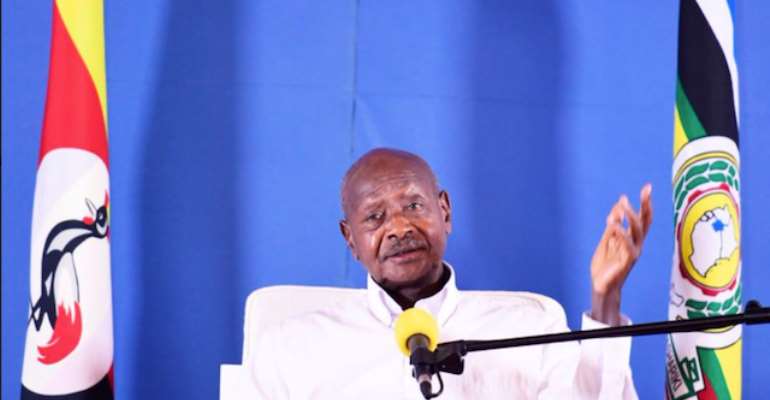The Problem With General Museveni I: He Has No Exit Strategy

The problem with Uganda’s dictator Yoweri Museveni is that he’s backed himself in a tight corner. He’s got no exit strategy except to remain in power until he dies.
Barring that, Museveni would prefer a fictitious military “coup” whereby a “new” regime would protect him, his family, and their financial and commercial interests. In reality it would be a government where Museveni would continue pulling the strings from the background while remaining chairman of his ruling National Resistance Movement (NRM) party.
He may be concerned that this maneuver may not be sufficient. Jose Eduardo dos Santos tried it in Angola. In 2017 his protege Joao Lourenco succeeded him after he’d held power for 38 years. Dos Santos remained chairman of the ruling party. Today, he’s living in exile while Angola is working to recover the more than $1 billion accrued by his daughter Isabella dos Santos.
Of course Museveni doesn’t want to go into exile. He cannot afford to lose an election to a candidate like Robert Kyagulanyi, a.k.a. Bobi Wine, who represents the new Uganda, the youth. They comprise the overwhelming 80% of the nation’s population. They will surely vote for Bobi Wine.
Museveni fears that a post-Museveni government not engineered and controlled by Museveni would not secure and protect his interests. To Museveni, the interests of Museveni and the Museveni family are paramount. They are more important than the interests and well-being of Uganda, as he told Kenyan journalist Jeff Koinange. The late Congolese dictator Mobutu liked saying, “Je suit l’etat,” meaning “I am the state.” Likewise for Yoweri Museveni.
Museveni knows that a military regime would not endure in Uganda. The regime would be condemned by the African Union (AU), the United States, and the EU. Might a military regime be able to buy itself breathing room of several months during which it can claim it’s on a mission to restore order before returning power to civilians?
In Mali, the military seized power from an elected president Ibrahim Boubacar Keita in August 2020. The regime was roundly condemned by the AU and international community. The regime arranged a managed “consultation” with civil society. The regime created a caretaker administration with a “civilian”—former defense minister Bah Ndaw—as president. The apparent coup master Col. Assimi Goita became vice president. In other words, the military maintains power during the interim period.
Mali’s coup and aftermath emulates the Sudan’s. There, Omar Hassan Bashir was deposed by the military in 2019, after 30 years in power. This followed a popular uprising. The army entered into an interim administration—a compact with civilians, leading toward promised elections. Today Bashir is in prison facing trial on charges related to his role in the 1989 coup that brought him to power. The ICC also wants him at the Hague; the court issued a warrant for his arrest in 2009 in connection to his alleged role in crimes against humanity carried out against people in Sudan’s Darfur region.
In both Sudan and Mali there had been sustained protests for several months. The coups likely intercepted popular revolutions. In Mali, France may have encouraged the takeover. The Gulf states that finance Sudan’s government may have promoted Bashir’s exit.
In Uganda, after 34 years in power, Museveni may have outlived his usefulness to the U.S. and U.K., the two primary sponsors of his regime.
Faced with the prospects of losing in a landslide to Bobi Wine, Museveni might attempt to engineer his own Mali, or Sudan exit. He may be pondering whether to trigger a friendly “coup” before or after Uganda’s Jan. 14 presidential election.
How might Museveni engineer a pre-election coup? He could order a massacre. After he arrested leading presidential candidate Bobi Wine, leader of the National Unity Platform (NUP), on Nov. 18, his supporters protested. In the days and weeks that followed Museveni’s armed forces killed a reported 85 people. Museveni could order anothe
